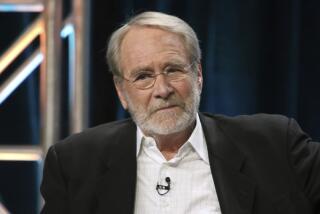HE’S PLAYING HIS GAME : Stull, a Modern Pentathlete and Fencer, Ready for Competition, Not Controversy
- Share via
Bo Jackson competes in two sports. So does Rob Stull.
The comparison stops there.
Jackson’s sports are baseball and football, totally unrelated activities. Stull’s are modern pentathlon and fencing, which are closely related, since fencing is included in modern pentathlon.
Jackson makes more than a million dollars a year. Stull makes a living at horse shows, putting fences back together.
But Stull will do something this month that Jackson can’t. Stull will compete in the Olympics in his two sports.
Stull, 27, admits that his chances of winning individual medals in both events aren’t great. He has a chance at one in the modern pentathlon, but fencing will be a struggle.
Perhaps more important, though, Stull will be looking to erase the memories of the 1984 Olympics. He made the U.S. modern pentathlon team in ’84 but was at the center of controversy.
If it had been a different sport, the controversy probably would have made the evening newscasts. But modern pentathlon--a combination of five events, horseback riding, fencing, shooting, swimming and running--is not a sport that little kids dream about.
The mini-drama that unfolded around Stull included accusations of cheating, lie-detector tests, an investigation, an Olympic hearing, and a lawsuit. The experience still draws Stull’s ire.
“You bet I’m angry,” Stull said. “It was terrible. I was deprived of an opportunity to compete in the Olympics.”
Dan Steinman, president of the United States Modern Pentathlon Assn., refuses to talk about the 1984 controversy.
“That’s ancient history,” he said.
Back in 1984, a young man from Damascus, Md., who wasn’t expected to make the Olympic team, did just that. Stull surprised many by finishing third at the Olympic trials and earning a spot on the four-man Olympic team.
But his qualification was soon questioned. Several athletes accused him of cheating. They alleged that Stull solicited friends in the competition who had no chance of qualifying to throw bouts in the fencing competition for his benefit.
Seven modern pentathletes filed a formal protest, and the USMPA conducted a lengthy investigation that involved the unprecedented use of lie-detector tests.
The top four finishers at the trials were given polygraph tests, which the USMPA said were strictly voluntary. Stull says they didn’t have much of a choice.
“Here’s how voluntary it was,” Stull said. “One official said to us, ‘If you fellows don’t take the polygraph test, we’ll take qualifiers five through nine for the team.’ It was hardly voluntary. It was an inquisition.”
Stull’s polygraph test proved inconclusive. But the USMPA said it had found in its investigation a “substantial body of evidence” that Stull had cheated in fencing.
After a 12-hour hearing in San Antonio that included testimony from 18 witnesses, a four-man independent panel ruled that there was no evidence that Stull cheated in fencing. Stull was on the Olympic team.
But it wasn’t over yet.
“My attorney suggested that I get an injunction against the association to assure I stayed on the team,” Stull said. “I didn’t. I said I wanted to put this behind me. I really believed that I was the last person they would screw around with. Boy, was I wrong.”
After a meeting of modern pentathlon coaches, Stull--although he had finished third at the trials--was given the fourth spot on the team. The fourth team member in the modern pentathlon is a reserve and does not compete.
Stull says an “illogical” scoring system was used to determine his place. He also believes the coaches were swayed by the controversy.
“It was my feeling that a lot of intimidating was going on,” Stull said. “The coaches were intimidated into voting a certain way. . . . Also, I think some coaches didn’t feel I was really fit to compete after having gone through hell with the (hearing).”
Stull went to the 1984 Olympics as a team member but watched from the sidelines. Looking back four years later, he says the controversy was the result of locker-room rumors gone out of control.
“There was a lot of locker-room talk about me throwing bouts,” Stull said. “There were a lot of mind games going on. A lot of things said were taken out of context.
“Some of the guys started believing what they were hearing, and they went to the (USMPA) officials. One official, Bill Askins (then secretary of the USMPA) took it seriously. . . . It was locker-room talk blown out of proportion, and he latched on to it like a pit bull.”
Askins no longer holds an official position with the USMPA, but he maintains contact with the association. In response to Stull’s comments, Askins said the association was only responding to the athletes’ protests. He was satisfied with the outcome of Stull’s 1984 hearing.
“I didn’t make a case out of it,” Askins said. “I didn’t latch onto anything. The association was responding to a protest leveled by the athletes. We were forced to investigate it.”
Askins also said that the controversy was a “very minor thing, really.”
But to Stull, it was major. If it hadn’t been for the events in 1984, he might not have made the trip to Seoul.
“It’s not a revenge thing, like I have something to prove,” Stull said. “But I was denied an opportunity to compete. I’m bitter about it. It probably kept me in the sport. If things had gone like they were supposed to, I may have retired.”
But Stull stuck with it, working odd jobs and “nickel and diming it” to support himself in a sport that has no TV contracts or mega-buck endorsement opportunities.
Stull has put the real world on hold to pursue his Olympic hopes. He recently graduated from the University of Texas with a finance degree, whereas many his age are settled in their careers.
“It’s a matter of pride,” said Stull. “People my age have jobs and drive Beemers (BMWs). I know that Beemer is waiting for me. But after the 1984 Olympics, I felt slighted. I wanted to make the next team.”
After the ’84 Games, Stull joked that the first thing he would do was find a job “to earn some money to pay all my legal fees.” In fact, Stull sued the USMPA for money to cover his legal fees, which amounted to about $5,000, he said.
The lawsuit has recently been settled, and Stull said he is waiting for a check from the association.
Stull would like to put it all behind him at Seoul. He says things have changed dramatically within the USMPA. The controversy is dead.
“These four years and those four years (before the ’84 Olympics) are two totally different animals,” Stull said. “Big-time change.”
Stull is one of a few athletes with a definite chance of winning a medal in the modern pentathlon. According to Steinman, though, nothing is too far out of reach in this sport.
“The modern pentathlon is all if ,” Steinman said. “If horses are bad to bet on, the pentathlon is worse. So many different things can happen. You can be good in this sport, but you have to be good and have good luck to be successful.”
If Stull would happen to have all the above and win the gold medal, there’s no doubt in his mind what he would do next.
“I would retire immediately,” Stull said. “It would mean all the hard work has paid off. It’s been a long road, believe me. A lot of this stuff, you could make a movie about. Winning the gold would sure make a happy ending.
” . . . I’m not going in as the favorite. I’m not going to get on any Wheaties boxes or anything. I’m doing it as a personal thing, for me.”
In fencing, Stull faced the possibility of another bout with controversy, but not as severe. Stull made the U.S. fencing team by finishing second at the trials, but there was some concern in the United States Fencing Assn. about Stull’s fitness to compete in both sports.
The fencing competition for Stull will start a day after the modern pentathlon finishes. Stull said he has competed in similar circumstances before and wished to participate in both sports at the Olympics.
At a meeting earlier this week in Hawaii at the U.S. fencing team’s pre-Olympic camp, a decision was made by coaches and team members to let Stull compete in the individual fencing competition. Carl Borack, captain of the U.S. fencing team, supported Stull.
“I think he got so burned in 1984, he’s been scarred by that experience,” Borack said. “I think he (was) trying to keep all his options open. If we had been through what he has, we’d probably be scarred, too.”
More to Read
Go beyond the scoreboard
Get the latest on L.A.'s teams in the daily Sports Report newsletter.
You may occasionally receive promotional content from the Los Angeles Times.






